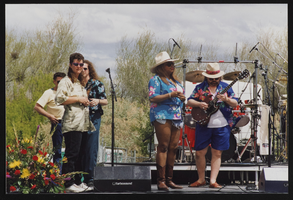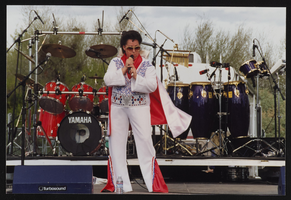Search the Special Collections and Archives Portal
Search Results
Trula McGee oral history interview
Identifier
Abstract
Oral history interview with Trula McGee conducted by Claytee D. White on March 17, 2021 for African Americans in Las Vegas: a Collaborative Oral History Project.
Trula McGee talks about her experiences growing up in a military family and her time as a student and young adult in the Westside community. She also discusses her employment as a Keno writer and runner at the Sands Hotel and Casino, Castaways Hotel and Casino, and the Silver Slipper Gambling Hall and Saloon and how this led to her meeting both Wayne Newton and Marvin Gaye.
Subjects discussed include: Carver Park; Basic High School; Nevada State Bank; Jackson Ave.; Golden West Shopping Center; Reuben's Supper Club; and Larry's Sight and Sound.
Archival Collection
Harrah’s Entertainment Corporate Archives
Identifier
Abstract
The Harrah’s Entertainment Corporate Archives (dating from 1811 to 2004 with the bulk of the materials dating from 1940 to 2000) contain the promotional and corporate files of Harrah’s Entertainment Inc. and its predecessors, as well as Bill Harrah’s personal papers and card game collection. The materials were compiled and developed as a corporate archive by Harrah's Entertainment, Inc.’s Corporate Communications Department. The collection is primarily comprised of casino and employee periodicals, reports, manuals, promotional files, ephemera, and newspaper articles that document Bill Harrah’s casinos in Reno, Nevada and Lake Tahoe as well as Harrah’s Inc., Holiday Inns, Inc., Holiday Corporation, the Promus Companies, and Harrah’s Entertainment, Inc. Also included are photographs that document the construction of Harrah’s properties, business operations, the people who worked and performed at Harrah’s properties, and Bill Harrah’s automobile collection. The collection also contains Bill Harrah’s collection of playing cards and card games. Also included are photographs of the Harrah family.
Archival Collection
Raul Daniels oral history interview
Identifier
Abstract
Oral history interview with Raul Daniels conducted by Maribel Estrada Calderon on July 03, 2019 for the Latinx Voices of Southern Nevada Oral History Project. In this interview, Daniels discusses his childhood memories of Cuauhtémoc, Mexico and later moving to Las Vegas, Nevada with his family in 1989. He talks about his father’s employment in construction and joining the painters union. Daniels then recalls attending Las Vegas High School, receiving his citizenship, and his experiences attending the University of Nevada, Las Vegas. Daniels describes learning about The LGBTQ Center of Southern Nevada, studying international business, his employment at Neiman Marcus, and eventually becoming the Vice President of Catering with Station Casinos. Later, Daniels discusses what The Center meant to him as a gay teen and being a member of the Student Organization of Latinos (SOL). Lastly, Daniels recalls going through the adoption process for his son and talks about Aids for Aids Nevada (AFAN).
Archival Collection
Robert Maheu oral history interview
Identifier
Abstract
Oral history interview with Robert Maheu conducted by K. J. Evans on April 19, 1999 for the Las Vegas Review-Journal First 100 Oral History Project. In this interview, Maheu discusses Howard Hughes and attempts by Bill Gay and associates to take Hughes' business. Maheu then discusses his career in the FBI and CIA before moving to Las Vegas, Nevada. Finally, Maheu talks about working for Hughes.
Archival Collection
I. Archived websites, 2020 to 2021
Level of Description
Scope and Contents
The websites archived in this series were selected by UNLV Special Collections and Archives staff to represent a broad overview of community reaction to COVID-19 in the Las Vegas Valley from March 2020 to July 2021. Websites from local news media, educational institutions, the hospitality industry, arts and entertainment industry, municipal governments, public health departments, and UNLV are represented in this series.
Archival Collection
Collection Name: UNLV Libraries Collection of Digital Communication about COVID-19 in Las Vegas
Box/Folder: N/A
Archival Component

Musical group performing at Gay Pride: photographic print
Date
Archival Collection
Description
Image
Southern Nevada Jewish Heritage Project Web Archive
Identifier
Abstract
The Southern Nevada Jewish Heritage Project Web Archive contains archived websites that were captured between 2016 to 2018 that are related to UNLV University Libraries community documentation project, the
Archival Collection
National Archives grant, 1985
Level of Description
Archival Collection
Collection Name: Southwest Oral History Association Records
Box/Folder: Box 01
Archival Component

Darcelvis performing at Gay Pride, image 002: photographic print
Date
Archival Collection
Description
Image
Gay and Lesbian Community Center of Southern Nevada Records
Identifier
Abstract
The Gay and Lesbian Community Center of Southern Nevada Records (1992-2023) and include news articles, institutional records such as bylaws, agendas, and meeting minutes, ephemera, and programs for the Center’s annual Honorarium fundraiser. Additional materials include materials relating the the wellness clinic.
Archival Collection
